| Article ID | Journal | Published Year | Pages | File Type |
|---|---|---|---|---|
| 996538 | Energy Policy | 2010 | 13 Pages |
Micro-cogeneration (micro-CHP) is a new technology at the household level, producing electricity in cogeneration with domestic heating, thereby increasing the overall efficiency of domestic energy production. We have developed a prototypical agent-based simulation model for energy technologies competing for demand at the consumer level. The model is specifically geared towards the competition between micro-CHP and incumbent condensing boilers. In the model, both technologies compete on purchase price and costs of usage, to which various (types of) consumers decide on the installation of either technology.Simulations with various gas and electricity prices show that micro-CHP diffusion could be seriously inhibited if demand for natural gas decreases, e.g. due to insulation measures. Further simulations explore various subsidy schemes. A subsidy for purchase is only found to be effective within a limited range of €1400–3250. A subsidy based on decreasing price difference between the competing technologies is much more cost effective than fixed purchase subsidies. Simulations of a subsidy scheme for usage show that a fast market penetration can be reached, but this does not yet take full advantage of technological progress in terms of decreasing CO2 emissions. Selection of the most effective scheme thus depends on the policy criteria assumed.
